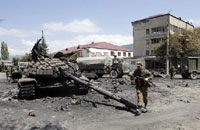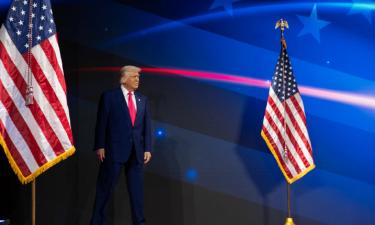With War in South Ossetia, the West Crossed Russia's Red Line
On August 8 Russia will mark one year since the war in South Ossetia. Russian and foreign experts said in an interview with Pravda.Ru that Russia’s relations with the West had improved lately after many years of tension, but added that the conflict with Georgia pointed a number of weak points in the Russian army.

The geopolitical state of affairs changed considerably after Georgia’s aggression against South Ossetia. Russia’s relations with the European Union and the United States worsened as a result of the war. Britain, Poland, the Baltic States and Sweden insisted the EU should suspend the development of the new Russia-EU Treaty. Russia’s relations with the USA hit the lowest point since the collapse of the USSR. However, the diplomatic ties between Russia, the USA and the EU subsequently improved and even became better than they were before the war.
At the same time, the conflict unveiled a number of problems in the Russian army. Official spokesmen for the Russian General Staff acknowledged them too. For instance, Russia lost several warplanes against only one Georgian plane. Nevertheless, Georgia with its state-of-the-art Ukrainian, American, European and Israeli military hardware was defeated.
Konstantin Zatulin, a deputy of the Russian Parliament, said that Russia should obviously learn several lessons from the war.
“Russia must get rid of the myths of the past in its foreign politics. Russia used to recognize Georgia’s territorial integrity before the war broke out. However, it was clear from the very beginning that it was impossible to peacefully retrieve the erstwhile integrity, which Georgia had during the Soviet times.
“The Georgian regime found itself in a very complicated political situation. Mikhail Saakashvili still holds power in Georgia in his hands because he enjoys the support from the United States. The Georgian opposition does not differ from the sitting Georgian government much,” the official said.
Inal Pliyev, an assistant to First Vice Prime Minister of South Ossetia, who saw the war with his own eyes, said that no one should ever trust any documents, which Georgia signs.
“Georgia will never keep its promises. It is the matter of Mikhail Saakashvili – he is not the first Georgian leader who exterminated the Ossetians. Georgia has always been intolerant and hostile to ethnic Ossetians. About 160,000 Ossetians used to live in Georgia in 1991, but the current number of the Ossetian population amounts to 46,000. Where did the rest go ? Tens of thousands of Ossetians, who used to live in Georgia, had to flee their homes to save their lives. Many of them were not that lucky, though.
“The most important international result of the war is the fact that international structures, such as the OSCE, are completely incapable of maintaining peace in the world. Where was the OSCE mission at the time when Georgian tanks were shelling Tskhinvali?” the official said.
Konstantin Sivkov, a military expert, said that the USA was using a strategy of indirect action to lay the burden of the war on Georgia only.
“The USA needs Georgia because it is a platform from where the USA can put pressure on Russia and Iran. This region is rich with oil and gas. The USA intends to cut Russia from the Black and the Caspian seas.
“The military results of that campaign are contradictory for Russia. On the one hand, Russian soldiers and officers showed their morale, their spiritual potential. It was clear that the Georgian army was much worse. However, the bravery and courage of Russian soldiers does not cancel the huge problems, which the war unveiled,” Mr. Sivkov said.
Alexander Rar, a scientist of politics:
“Putin drew a red line at the security conference in Munich in 2007: Ukraine and Georgia should not join NATO. Putin’s statements at the conference set Russia in an opposition to the West.
“The war in South Ossetia was supposed to occur because there were too many conflicts there. The West was led to believe that Russia had taken South Ossetia and Abkhazia away from Georgia. However, nothing happened afterwards. A new cold war is no longer an issue. The West realized that it had stepped over the red line. Western countries realized that they needed to develop their relations with Russia for the solution of global problems.
“The West will not recognize Abkhazia and South Ossetia during the upcoming ten years. At the same time, neither Ukraine, nor Georgia will become NATO members, which is obviously a great achievement of Russia’s diplomacy,” the expert concluded.
Tatiana Barkhatova
Vadim Trukhachev
Pravda.Ru
Also read: Painful memories of S. Ossetian war
Subscribe to Pravda.Ru Telegram channel, Facebook, RSS!




